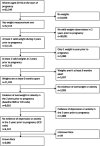This is a preprint.
Pre-pregnancy weight loss associations with prenatal and postpartum mental health conditions: A retrospective cohort study
- PMID: 37720051
- PMCID: PMC10503832
- DOI: 10.21203/rs.3.rs-3232490/v1
Pre-pregnancy weight loss associations with prenatal and postpartum mental health conditions: A retrospective cohort study
Abstract
Background: Obesity is a risk factor for adverse outcomes during and following pregnancy. Most women are advised to lose weight prior to becoming pregnant, to help alleviate complications including prenatal and postpartum depression and anxiety. Yet, no studies have examined how the process of losing weight prior to pregnancy interacts with the development of prenatal and postpartum mental health disorders.The objective of the study was to determine if women with pre-pregnancy weight loss (≥10%) vs. those who do not, in the two years prior to pregnancy, have a lower risk for new onset prenatal and postpartum mental health conditions.
Methods: This retrospective cohort study used data from the Virtual Data Warehouse of a large Midwestern, U.S. based hospital system. The final sample consisted of 6,085 female patients of reproductive age that had given birth between 10/1/2011-6/30/2020 and had two recorded weights in the year prior to conception. Univariate analysis between weight loss and outcome variables (pre-natal and post-partum depression and anxiety) and multivariate analysis using logistic regression was conducted for variable significant on univariate analysis.
Results: On univariate analysis, women with pre-pregnancy weight loss had increased odds of post-partum depression (OR=1.47, 95%CI=1.03-2.10), though decreased odds of prenatal anxiety (OR=0.59, 95% CI 0.33-0.90). After controlling for confounders in the multivariate analysis, there was not a significant difference in the odds of post-partum depression; however, women who lost weight had approximately half the odds of having prenatal anxiety than those who did not lose weight (OR=0.54, 95%CI=0.33-0.90).
Discussion: The experience of achieving weight loss prior to pregnancy may foster a sense of agency within pregnant women, helping them to reduce their experience of pre-natal anxiety. Providers could engage in patient conversations around weight loss and mental health management in a strengths-based framework to continue to foster this sense of agency.
Conclusion: Anxiety and depression were uniquely related to pre-pregnancy weight loss. Pre-pregnancy weight loss was associated with lower odds of prenatal anxiety and higher odds of postpartum depression. These results highlight the need for real world examination of pre-conception treatment recommendations and their association with non-physical health-based outcomes.
Keywords: anxiety; depression; pregnancy; weight loss.
Conflict of interest statement
Conflicts of Interest: The authors declare they have no conflict of interest.
Similar articles
-
The effect of weight management interventions that include a diet component on weight-related outcomes in pregnant and postpartum women: a systematic review protocol.JBI Database System Rev Implement Rep. 2015 Jan;13(1):88-98. doi: 10.11124/jbisrir-2015-1812. JBI Database System Rev Implement Rep. 2015. PMID: 26447010
-
Association of antepartum depression, generalized anxiety, and posttraumatic stress disorder with infant birth weight and gestational age at delivery.J Affect Disord. 2020 Feb 1;262:310-316. doi: 10.1016/j.jad.2019.11.006. Epub 2019 Nov 4. J Affect Disord. 2020. PMID: 31733923 Free PMC article.
-
Associations between COVID-19 lockdown and post-lockdown on the mental health of pregnant women, postpartum women and their partners from the Queensland family cohort prospective study.BMC Pregnancy Childbirth. 2022 Jun 4;22(1):468. doi: 10.1186/s12884-022-04795-9. BMC Pregnancy Childbirth. 2022. PMID: 35659202 Free PMC article.
-
Direct economic burden of mental health disorders associated with polycystic ovary syndrome: Systematic review and meta-analysis.Elife. 2023 Aug 3;12:e85338. doi: 10.7554/eLife.85338. Elife. 2023. PMID: 37534878 Free PMC article.
-
Associations of Unintended Pregnancy With Maternal and Infant Health Outcomes: A Systematic Review and Meta-analysis.JAMA. 2022 Nov 1;328(17):1714-1729. doi: 10.1001/jama.2022.19097. JAMA. 2022. PMID: 36318133 Free PMC article.
References
-
- American College of Obstetricians and Gynecologists. Obesity in Pregnancy: ACOG Practice Bulletin, Number 230. Obstet Gynecol. 2021;137(6):e128–44. - PubMed
-
- Cameron N, Godino JG, Skipper T, Dillon L, Waalen J, Hill L, Patrick K. Associations between reliable changes in depression and changes in BMI, total body fatness and visceral adiposity during a 12-month weight loss trial. Int J Obes. 2018;43(9):1859–62. 10.1038/s41366-018-0272-1. - DOI - PMC - PubMed
-
- Dachew BA, Ayano G, Betts K, Alati R. The impact of pre-pregnancy BMI on maternal depressive and anxiety symptoms during pregnancy and the postpartum period: A systematic review and meta-analysis. J Affect Disord. 2021;281:321–30. - PubMed
Publication types
Grants and funding
LinkOut - more resources
Full Text Sources


